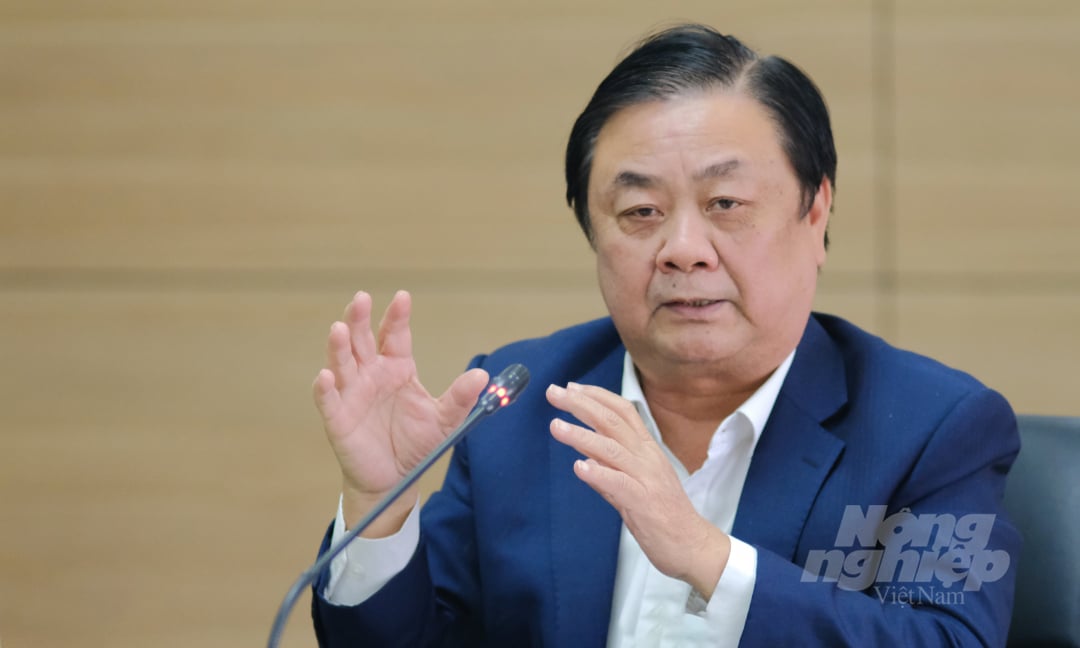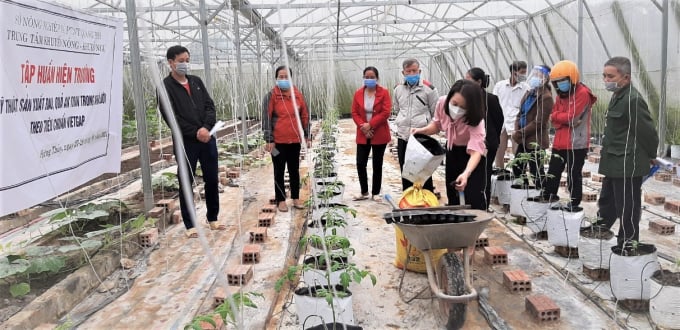May 20, 2025 | 08:58 GMT +7
May 20, 2025 | 08:58 GMT +7
Hotline: 0913.378.918
May 20, 2025 | 08:58 GMT +7
Hotline: 0913.378.918

Minister Le Minh Hoan spoke at the meeting with the National Agricultural Extension Center. Photo: Bao Thang.
In a meeting with the National Agricultural Extension Center on December 15, Minister of Agriculture and Rural Development Le Minh Hoan posed two questions for the agricultural extension system, namely: What is the agricultural extension? And why is it broken?
According to the Minister, "agriculture" is not only agriculture but also includes "agriculture, rural areas, farmers". Therefore, agricultural extension work encourages agricultural production, creates added value for agricultural products, and actively improves rural lifestyle and capacity building for farmers and communities.
"Agricultural extension is the center of production activities because the cultivation and husbandry industries, etc., want to direct the community; most of them have to implement agricultural extension", the Minister said.
Agriculture is converting from the mindset of agricultural production to an agricultural economy. Minister Le Minh Hoan said that the agricultural extension system could not be outside this flow.
He suggested that agricultural extension workers integrate multiple values in their daily work. Besides transferring technology, increasing productivity and output, preventing diseases, providing technical advice to people, the agricultural extension system needs to pay more attention to the economic values of the production chain such as quality, hygiene, and food safety, production costs, markets, as well as building commodity chains, establishing supply-demand connections.
When restructuring, the Minister said that the agricultural sector and the agricultural extension system must add many associations, cooperation, and increased sustainability factors. Specifically, the agricultural extension system needs to be pervasive, actively encouraging people to participate in community institutions. Firstly, let farmers share the simple problems in life, then build lasting benefits.
"There are many tasks for the agricultural extension in the new era. In addition to mobilizing farmers to join cooperatives, they also participate responsibly in organizing people's lives and production methods," Minister Le Minh Hoan said.
Deputy Minister of Agriculture and Rural Development Le Quoc Doanh said that agricultural extension, seed, and irrigation are Vietnam's agriculture three achievements. However, in the past, the agricultural extension system has been broken and lacks synchronization at the grassroots level, especially in remote areas.
According to the Deputy Minister, two things the agricultural extension system needs to do immediately are: The first is to connect the system vertically - from the central to local levels, and horizontally - between agricultural extension stations, grassroots extension groups, and institutes research, industry associations, businesses.

Agricultural extension officers guide people in farming techniques.
The second is to gradually build a systematic basis for the agricultural extension at the unit level. Deputy Minister Le Quoc Doanh commented that this is crucial to help people maintain and develop good agricultural models after they are built.
Besides resources, the Ministry of Agriculture and Rural Development will find mechanisms and policies to help grassroots agricultural extension groups operate periodically and develop. In addition, he advised the agricultural extension system to learn lessons from experiences from developed countries such as Thailand, Taiwan, and South Korea.
To create an agricultural product, people have to go through many steps such as cultivation, harvesting, post-harvesting, packaging, packaging, distribution, market... Minister Le Minh Hoan assessed that people could entirely create added value at any time stage.
Currently, the role of agricultural extension mainly lies in consulting, varieties, and farming procedures. Agriculture leaders recommend that, when putting a seed in the field, each extension officer needs to imagine how that agricultural product will be on the market.
"In the 4.0 era, agricultural extension is not simply a breed, a cultivation, but must create a harmonious working environment between people, forming a community lifestyle", the Minister expressed.
As a connection hub, the Minister oriented that the agricultural extension system should strengthen its initiative, create multilateral resources, and be ready to build the image of a new generation of farmers. It is the foundation for the long-term goals and strategies of agricultural extension.
Considering that agricultural extension is a very long value chain, from the raw material area to the finished product packaging to the consumer, Minister Le Minh Hoan pondered why so few agricultural enterprises are starting a business? He thinks that is it because the agricultural extension system - the center of the production chain - has not been correctly invested and built.
On the road to building rural areas into a livable place, the Minister believes that the soft values from agricultural extension activities will create a new generation of people joining hands for the benefit of the community.
In the immediate future, Minister Le Minh Hoan requested the National Center for Agricultural Extension to organize many seminars and invite a number of localities, agricultural extension leaders, and businesses to present and discuss new approaches; simultaneously, study the public-private partnership plan with the business sector.

A training session of agricultural extension officers in Hung Thuy commune, Le Thuy district, Quang Binh province.
The Minister also assigned units under the Ministry of Agriculture and Rural Development to study and advise on establishing grassroots agricultural extension groups into one of the criteria of new rural construction.
Director of the National Center for Agricultural Extension, Mr. Le Quoc Thanh said: "The meeting is a landmark, creating a turning point for the agricultural extension system."
Mr. Thanh committed to Minister Le Minh Hoan to turn the contents of the working session into concrete actions, adapting to the breath of the times. Despite the faults in some localities, he set the goal of "building with the brand name of Vietnam's agricultural extension".
To deal with the broken system, Deputy Minister of Agriculture and Rural Development Tran Thanh Nam suggested that agricultural extension identify three challenges. The first is to produce exactly what the market requires. At present, the role of agricultural extension is still relatively weak in orienting people. To solve it, he advised the agricultural extension system to build a model associated with raw material areas, exceptionally specialized farming areas.
The second is to strengthen links along the value chain. The annual operating capital of the agricultural extension system is currently challenging to meet the requirements of the new situation. Therefore, the Deputy Minister recommended that the agricultural extension system should find a way to mobilize resources from society.
The third is consolidating and improving agricultural extension capacity, connecting systematically from top to bottom.
Translated by Ha Phuc

(VAN) Vietnam aims to become a 'leader' in the region in the capacity and managing effectively soil health and crop nutrition.
![Reducing emissions from rice fields: [Part 1] Farming clean rice together](https://t.ex-cdn.com/nongnghiepmoitruong.vn/608w/files/news/2025/05/05/z6509661417740_a647202949c539012a959e841c03e1d3-nongnghiep-143611.jpg)
(VAN) Growing clean rice helps reduce environmental pollution while increasing income, allowing farmers to feel secure in production and remain committed to their fields for the long term.
/2025/05/19/5136-1-144800_230.jpg)
(VAN) The Nghe An Provincial People's Committee has just approved the list of beneficiaries eligible for revenue from the Emission Reductions Payment Agreement (ERPA) in the North Central region for the year 2025.

(VAN) 14 out of 35 domesticated elephants in Dak Lak province have had their living conditions improved, with 11 of them currently participating in the non-riding elephant tourism model.

(VAN) Muong Nhe Nature Reserve hopes that being upgraded to a national park will lay the foundation for forest protection efforts to be carried out in a systematic, modern, and sustainable manner.
/2025/05/16/3923-2-171845_52.jpg)
(VAN) Lower costs, higher yields, and improved soil quality are outstanding benefits that soybeans bring when integrated into the crop rotation system.

(VAN) The 'For a Green National Environment' programme aims to promote a green lifestyle, support businesses in implementing ESG practices, and turn Net Zero commitments into concrete actions.